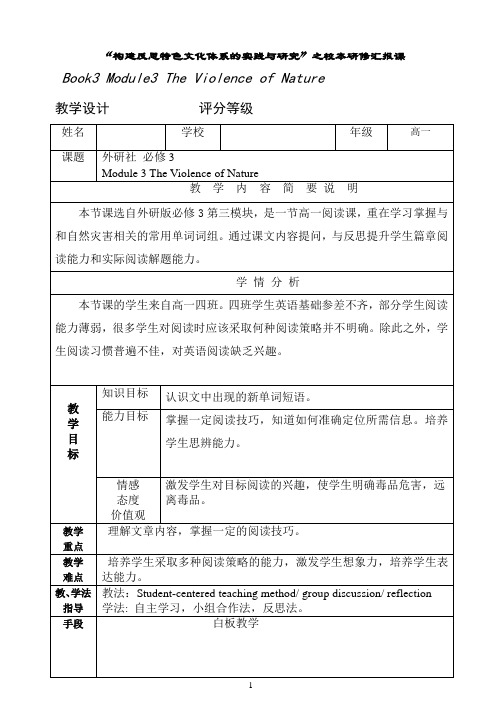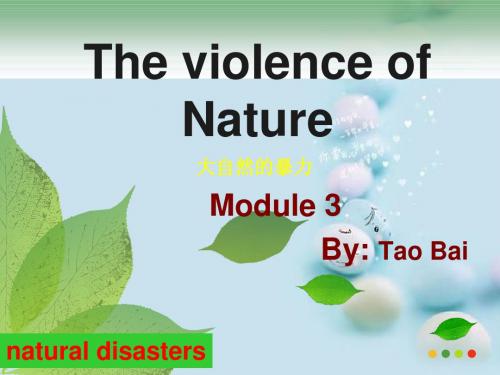Book3 Module 3 The Violence of Nature(语法)
- 格式:doc
- 大小:50.00 KB
- 文档页数:2





Book 3 Module 3 The Violence of NaturePeriod 1 Key words【课前预习】1.主题语境:本模块为“人与自然”主题下对“自然灾害与防范的探讨”。
文章介绍了龙卷风、飓风、地震等几种自然灾害,并描绘了人们在自然灾害中的经历和感受。
2.表达性技能:学会写一篇关于自然灾害的报道。
3.课时任务:通过阅读课文,了解龙卷风、飓风等自然灾害以及与飓风有关的奇怪事件,体会人们在经历自然灾害之后的感受,了解自然灾害的危害,提高自我保护和珍爱生命的意识。
【知识清单】一、[原文再现] Do you know anyone who has experienced one of the events? 你知道有谁经历过这些事件中的一件吗?experience vt. 经历;体验n. [C]经历;体验[U]经验常用搭配:experienced adj.有经验的;经验丰富的be experienced in在……方面有经验from / by experience 凭经验;从经验中full of experience 经验丰富have experience in在……方面有经验get / gain experience 获得经验1.What I saw was completely unlike anything I had experienced in the past.我所看到的完全不同于我过去所经历的。
2.She wants to know why her grandfather never spoke about his experiences in World War II.她想知道为什么祖父从不谈起他自己在第二次世界大战时的经历。
3.In the early days, she moved jobs to get experiences. 起初她通过换工作来获得经验。
4.I have experience in checking information from printed sources and from interview.我有从印刷资料及采访中校验信息的经验。

Oral Presentation of the Teaching Plan forModule Three, Book Three:“The Violence Of Nature”I. Teaching Material AnalysisThis is the 3rd unit in SEFC Book 3, and the topic is “natural disasters”. Teacher will introduce some different natural disasters to the students. Let them know the different features of the disasters. First, the teacher will deal with the words part. The teacher analyses some words about this module. What’s more, the teacher asks the students some questions, for example: “Can you describe the earthquake of China in 2008?” Through the oral practicing, students’ ability of describing the disasters can be improved. In addition, through this text, the teacher can help the students form a right attitude toward the disasters: don’t afraid of them and try our best to protect the environment,II. Teaching Objectives1. Language Objectives(1) Important words or phrases: Flood, hurricane, lightning, thunderstorm, tornado, column,current, disaster, luckily。
Module3 The Violence of Nature教学设计一、教学课型:共分四个课时:1:introduction;reading and vocabulary 整合为一节阅读课2;fuction;grammary 整合为一节语法课3:reading and speaking ;pronunciation 整合为一节听说读写课4:writing and culture corner 整合为一节泛读课二、教材分析:The Violence of Nature是外研版Book 3 Module 3的一篇阅读文章,文章共分3部分,分别介绍了几种自然灾害——龙卷风和飓风的形成和危害及一次异常事件。
三、教学目标:词汇目标:让学生识记并能正确运用以下词汇:ash, bury, current, disaster, erupt, flow, latitude, lava, occur, tornado, tropical, hurricane, pick up, take off, on average, end up等。
语法目标:学习过去完成时的被动语态的用法。
整体目标:理解含有所学生词、含有过去完成时的被动语态和间接引语的句子和段落,读懂其意义并获取信息;理解模块提供的和来自其他渠道的对不同自然灾害的介绍并获取信息。
功能目的:引导学生整体把握文章主旨,提高阅读效率;鼓励学生开展小组合作,运用副词表达好消息和坏消息。
情感目的:了解自然灾害的危害,结合发生在我国的两次大地震及甘肃省舟曲县的泥石流,激发学生学好科学文化知识的决心和信心,以实际行动作好与自然灾害作斗争的准备,为人类造福。
四、教学重点和难点:1. 通过阅读理解词汇,通过词汇学习掌握文章主旨,加深对文章的理解。
2. 理解文章中含有定语从句的句子及含有过去完成时的被动语态的句子。
3. 联系实际,了解不同的自然灾害带来的危害,激发学生利用所学知识与自然灾害作斗争的决心。
沾化二中高一课时学案
学科:英语姓名:班级:组别:使用时间:年月日编号:
课题Book 3 Module 3 The Violence of Nature
Grammar
编制人李金华
审核人高一英语组
学习目标1. 复习过去完成时的不同用法。
2. 过去完成时的被动语态。
3.熟练写出含有过去完成时的句子和段落.
目标达成1.通过课前自主学习达成目标1
2.通过合作探究完成目标2
课前自主学习学生纠错
翻译下列句子
1. 他的回答涵盖了大部分要点。
2. 老师要去美国,学生们也要去。
3. 很多学生期盼着去参观长城。
4. 这所房子(面积)是那所的两倍大。
5. 每天学习一些新东西是多么快乐的事啊!
6. 我家乡的建筑和北京的一点也不同。
7. 他们有一个叫朋朋的三岁的儿子。
8. 汤姆给我们讲了很多令人难以置信的故事。
9. 这本书和那本书相似。
课堂探究教师点拨
过去完成时的被动语态
过去完成被动语态的用法主要基于对完成时态和被动语态的理解。
主要语法
意义是在过去的过去被动接受的动作或状态。
下面专门就过去完成时做一些补充:(1)表示过去某时间前已经发生的动作或状态,这个过去的时间可以用by,
before等介词短语或一个时间状语从句来表示;或者表示一个动作在另一个过去
动作之前已经完成。
eg. ①We had just had our breakfast when Tom came in.
②By the end of last year they had produced 5, 000 bicycles.
(2)动词expect, hope, mean, intend, plan, suppose, wish, want, desire等用过去
完成时,表示过去的希望、预期、意图或愿望等没有实现。
eg. I had meant to take a good holiday this year, but I wasn’t able to get away.
还有一种表示“过去想做而未做的事”的表达方式:
intended (expected, hoped, meant, planned, supposed, wished, wanted, desired) +
to have done sth.
eg. I meant to have told you about it, but I forgot to do so.
(3)过去完成时常用于以下固定句型:
eg. ①hardly, scarcely, barely + 过去完成时+ when + 过去时。
Hardly had I got on the bus when it started to move.
②no sooner +过去完成时+ than +过去时。
No sooner had I gone out than he came to see me.
③by (the end of ) +过去时间,主句中谓语动词用过去完成时。
The experiment had been finished by 4 o’clock yesterday afternoon.
自主测试:
1. We must ____ the truth of the matter.
A. find
B. find out
C. discover
D. notice
2. What ____ her to give up the job?
A. made
B. let
C. caused
D. had
3. She is ____ better today, so she wants to take a walk outside.
A. any
B. much
C. a little of
D. a great deal of
4. I don’t know what has ____ to Li Mei.
A. been happened
B. been taken place
C. happened
D. been occurred
5. I didn’t know what to do but then an idea suddenly ____ to me.
A. occurred
B. happened
C. hit
D. took place
自主测试教师点拨
6. They sent several reporters to ____ the meeting.
A. observe
B. discover
C. find
D. cover
7. Jumping out of ____ airplane at ten thousand feet is quite ____ exciting experience.
A. /, the
B. /, an
C. an, an
D. the, the
8. Is this the reason ____ at the meeting for his carelessness in his work?
A. he explained
B. what he explained
C. how he explained
D. why he
explained
9. ____ the new policy, we are now having a happy life.
A. Because of
B. Because
C. Thanks for
D. For
10. I took the medicine, but it didn’t have any ____ on me.
A. answer
B. effect
C. cause
D. affect
11. By the time it ended, more than 700 people ____ and 2700 ____.
A. has been killed; has been injured
B. has killed; has injured
C. had been killed; had been injured
D. had killed; had injured
12. It suddenly ____ me ____ we could improve the situation.
A. happened; what
B. occurred; why
C. struck; how
D. realized; who
13. When I was in London, I picked ____ some English.
A. out
B. up
C. off
D. away
14. ____ average, I go back home every two weeks.
A. At
B. By
C. In
D. On
15. They can destroy houses, ____ leave the furniture inside exactly ____ it is.
A. but, where
B. and, when
C. but, when
D. and, where。